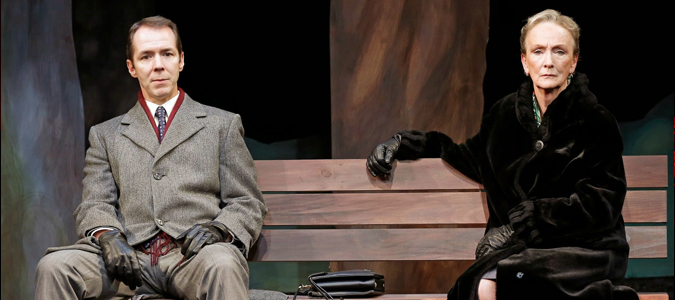

A Walk in the Woods
Opening Night: September 30, 2014
Closing: October 18, 2014
Theater: Clurman Theatre
A Walk in the Woods tells the story of a Russian veteran and an American newcomer who meet informally after long, frustrating hours of peace talks
BUY TICKETSREAD THE REVIEWS:
September 30, 2014
Typically, the two arms negotiators—one American and one Russian—who discuss their political wants and fears in playwright Lee Blessing’s 1998 Pulitzer finalist A Walk in the Woods are played by two men. Keen Company’s rather chintzy but solidly acted revival (playing at the Clurman Theatre Off Broadway until Oct. 18) gives one of those characters a sex change: The production swaps in estimable theater vet Kathleen Chalfant (Wit) as the duo’s playful, Soviet half, which transforms an older gent narrative into more of a mother/son needling session. (The somewhat younger Paul Niebanck plays the stiff American.) Does the switch work? Yes and no.
READ THE REVIEWSeptember 30, 2014
In hindsight, America had it easy in the 1980s. None of that hydra-headed terrorist nonsense: The enemy was the good ol’ USSR, and we could engage in civilized negotiations over a decent meal. The revival of Lee Blessing’s 1988 A Walk in the Woods brings us back to that simpler time via a series of conversations between two arms negotiators. Representing the Soviets and the Americans, respectively, are Irina Botvinnick (Kathleen Chalfant) and John Honeyman (Paul Niebanck). Stationed in Geneva, they’re supposed to hash things out on behalf of their countries. Except the play doesn’t take place around a large table but on the outskirts of town, where the two meet for informal conversations — a more accurate title would be “A Series of Chats in a Suburban Forest.”
READ THE REVIEWSeptember 30, 2014
There’s no good reason to revive A Walk in the Woods, but there’s a good reason to see it: Kathleen Chalfant. Playing a wily Soviet diplomat, she is given the best moments in this mild two-character drama, and she’s always wonderful to watch. Loosely based on a real event, Woods finds an American negotiator and his Soviet counterpart during arms treaty talks in Geneva. To break the monotony of their indoor meetings, the two take a series of open-air strolls together. Soon they’re discussing history and nuclear warfare. The script, by Lee Blessing, looks to shrink giant issues to a manageable size, and, unsurprisingly, have each individual learn a little from the other.
READ THE REVIEW




















